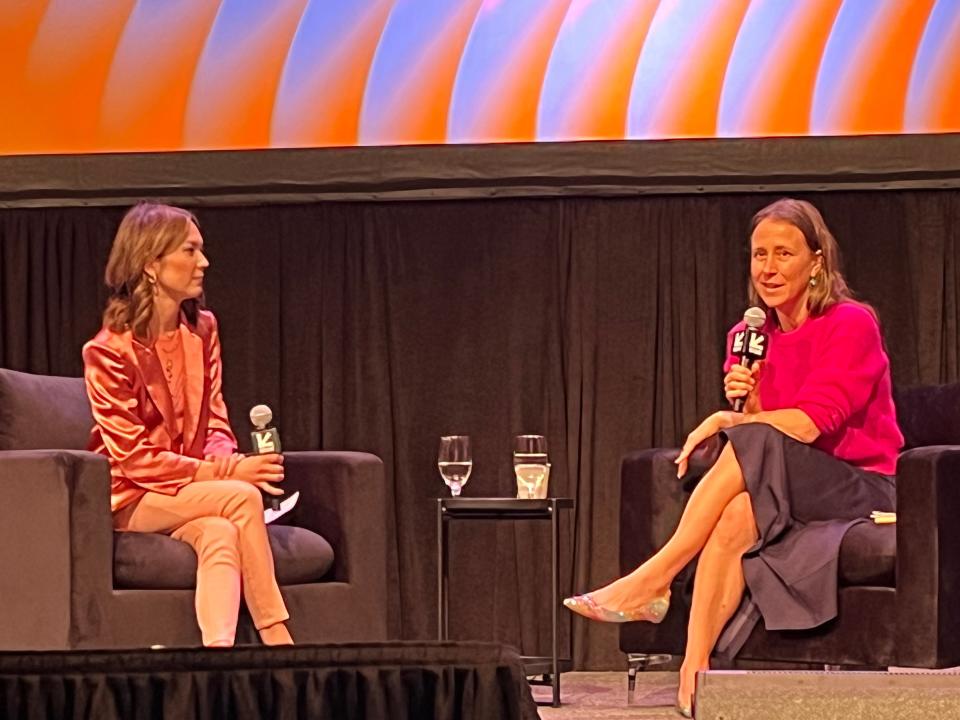5 things to know about AI, genomics and personalization of health care from 23andMe's Anne Wojcicki at SXSW
- Oops!Something went wrong.Please try again later.
Health care will be more personalized because that's what consumers want, said Anne Wojcicki, the co-founder and CEO of 23andMe genomics profile company, in a conversation with Bloomberg's Emily Chang on Friday afternoon at South by Southwest.
Here are five takeaways from that conversation:
AI is here to stay
"I remember in '99 and 2000 when people were hypothesizing about the internet," Wojcicki said. ... "This is a moment where things are shifting."
It's not a question of whether to use artificial intelligence, but how to use it, she said.
"We are already using AI and machine learning in drug discoveries and what are the therapies that have worked. I see the potential."
"The most interesting thing that you're going to get from AI is prediction," she said. "What would it be if your clinician could walk in and say, 'Hello, Katie, based on your life, you are three years away from diabetes'?"
If you had that information, you might be likely to do the things to change that prediction, she said.
"What I'm passionate about is prevention," she said. ... "The problem with prevention studies is it takes a long time." She gives the example of a 30-year study on Alzheimer's disease.
Using AI, "is it possible to predict what behaviors can help you prevent a disease?" she asks.
AI also could help with risk predictions, "to truly understand what risks truly are but also what risks are not," she said.
"Why is it that some people have a disease and some people do not?" she asks.

23andMe could be an answer to a national monitoring system
One thing that COVID-19 exposed is that we don't have a true national health surveillance system, Wojcicki said. Different centers share data with other collection centers, but it's not uniform.
23andMe became a provider of information through the surveys it did on COVID-19-related questions as well as other health topics and non-health topics.
At the beginning of the pandemic, it asked customers about COVID-19 and whether they had had it and what their symptoms were. More than 750,000 customers answered the survey even though most of them hadn't yet had COVID-19.
From that data, 23andMe was able to figure out that blood type played a roll in the susceptibility of the disease and the outcome of the disease, she said.
"When something does happen, I can email my customers and get a response," she said.
She's found that people want to give their opinions, and they also want their health data to be used to find solutions to medical problems, she said.
"We live in a world of data collection," she said and described 23andMe as the largest genomic data collector, "I think that is the world of the future."
More coverage:After Uvalde shooting, experts say mental health reform not enough to keep schools safe
Data collection should be used for good
"My research mission is how do I accelerate the state of health," Wojcicki said.
More than 80 percent of 23andMe customers contribute their health data to research, but they can always opt out.
"The core values of our therapeutics team is every day matters," she said. "Us sitting on data is a disaster. The onus is on us to make decisions, that we are making discoveries, that we are helping to develop drugs.
Health care must be personalized
The pandemic brought on the rise of consumer health care and the rise of telehealth, Wojcicki said.
"People are used to personalization," Wojcicki said. "My Instagram and Twitter feeds are very different from my son's."
If you knew that based on your genomes, you had a mutation associated with blood clots, you might get prescribed a different birth control. You might know based on your genomes when to do your cancer screenings rather than just the universal screening recommendations. Your genomes might also determine which depression medication will work better for you than others.
SXSW highlights: Chelsea Handler takes SXSW 2023 stage to talk abortion, politics and eating soup topless
The use of genomics will expand
Health care has a 20 year cycle, she said. This is the 20th anniversary of the sequencing of the human genome. At first it was exciting, then there was a, she said. backlash. Now, she said, "we're coming back with a positive perception."
Doctors, who were heavily against 23andMe initially, are finally starting to see the value in using genomics to personalize health care, Wojcicki said.
23andMe bought Lemonaid Health, a telehealth company with a pharmacy, in 2021 to provide an avenue for more access to genomics.
"I want to own genomic medicine," she said.
To her that means, having the clinicians who can chat with customers about their 23andMe results, and tailor their medical care to them. It also means consulting with physicians who don't have that expertise to better help their patients. It means catering prescriptions to a person's genomes. And it means using AI to make the predictions about a person's health.
This article originally appeared on Austin American-Statesman: AI, genomics and personalization of health care from 23andMe co-founder Anne Wojcicki at SXSW

